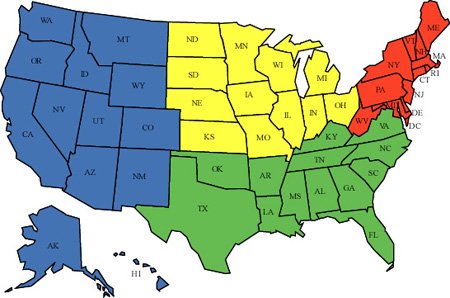|
The Regional Lottery Plan Summary The National Association of Secretaries of State (NASS) recommended the Rotating Presidential Primary Plan in 2000, and the Carter-Baker Commission on Federal Election Reform endorsed it in its September 2005 report. In 2007, Senators Amy Klobuchar, Joe Lieberman and Lamar Alexander introduced legislation to implement it. How it Works 
Under the proposal, the United States is divided into four regions - Northeast, Midwest, West, and South - having roughly the same number of votes in the Electoral College according to the 1990 census. The Northeast region (in red) comprises of 13 states and 127 electoral votes. The Midwest (in yellow) has a 129 electoral votes spread across 12 states. The 13 western states (in blue) have 119 electoral votes. The South is the largest region (in green) with a total of 163 electoral votes across 13 states. In the first round, the primary schedule will be as follows:
Subsequently, the regions will start rotating. In the next election cycle, the South will move up to first position, followed by the Midwest, West, and the East. In the third round, the Midwest will go first, and so on. Primaries in each state would be scheduled on or about the first Tuesday of the month assigned to its corresponding region, but not all states in a given region would hold their primaries on the same date. An important feature of the plan is that it allows Iowa and New Hampshire to retain their lead positions in the primary schedule. These states still get to go first before the rest of the nation votes in primaries on a rotating basis. Strengths: The plan eliminates frontloading and extends the race, thereby allowing voters to vet candidates over a longer period of time, and allowing dark-horse candidates to pick up pace in the later stages. The plan divides the primary calendar along regional lines, but it also gives equal weight to all regions as they all get to go first by turns. Over a span of a few election cycles, campaign attention will distribute equitably over all the regions, and no particular region will permanently hog the limelight. The plan would, therefore, do away with the pressure of orchestrating a de facto national campaign – a major repercussion of the frontloading scenario. It would allow candidates to focus on regional issues, reduce campaign expenditure by enabling more focused spending, reduce campaign fatigue, and promote meaningful interaction between candidates and voters. Candidates will get to hear the concerns and complaints of regional voters from coast to coast, not just in one corner of the country. They will hear about the no-tax pledge in New Hampshire and ethanol policy in Iowa, but also about union concerns in the Great Lakes, cotton prices in the South, or immigration in the Southwestern border states Weaknesses: The plan retains the prerogative of Iowa and New Hampshire to go first, and the consequent problems. Candidates will continue to homestead and maintain permanent campaigns in these states. In fact, the predictability of the primary calendar will increase the scope of homesteading beyond just these two states. Candidates will know years in advance which region will go first in a particular election cycle. Hence, they will be encouraged to homestead in an entire region, and time their presidential bids in accord with a regional order that is to their advantage. In all, homesteading might extend over several election cycles instead of just a few years |
Fix the Primaries: Senator Bill Brock
Former US Senator
(R - Tennessee) Damian Carroll
President
San Fernando Valley Young Democrats David Phelps
Executive Board Member
California Democratic Party Rob Richie
Executive Director
FairVote Tom Sansonetti
Former Assistant Attorney General of the Environment and Natural Resources Division of the Department of Justice
Prof. Larry Sabato
Center for Politics
University of Virginia Tova Wang
Vice President of Research
Common Cause Professor Marilyn Dudley-Flores
CEO, OPS-Alaska
Sonoma State University California Democratic State Central Committee |
|
rr@fairvote.org
(301) 270-4616 6930 Carroll Ave Suite 610 Takoma Park, MD 20912 |


